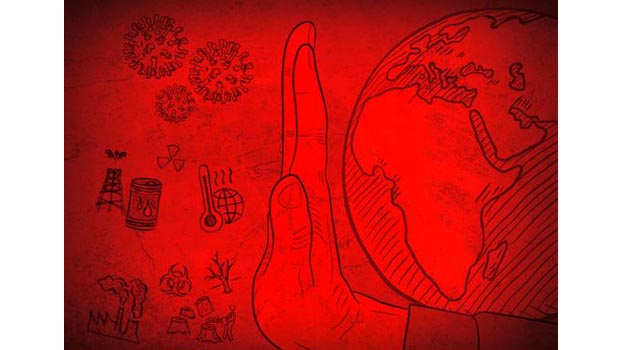After Corona: ‘New normal’ or ‘same-same’
Heartening as it may be, restoration of our life as we knew it, may not be our best bet

There’s scarcely a family anywhere in the world which hasn’t had a brush with the novel coronavirus COVID-19. During the raging pandemic, some, unfortunately, have lost loved ones. Others have combated the virus and recovered or know someone who has.
Even as I write this, my wife’s parents, brother, sister-in-law, and little niece are battling the disease. One of their house-helps, already hospitalised for ten days with high fever, is now luckily on the mend and expected to be discharged soon.
With several vaccines in the offing, some already approved and expected to be available soon, perhaps we are, at last, seeing the proverbial light at the end of the tunnel. Though this is no time for complacency, it is likely that the world will gradually limp back to some semblance of normality over the coming few months. The new year is going to be better in this respect. But heartening as it may be, the restoration of our life as we knew it, may not be the best bet.
The real question is whether we can afford to return to business as usual? Should the new normal be the same as the old? Environmentalists have already warned that it is our destruction of natural habitats that has brought us in dangerous proximity with infection-carrying birds and animals.
The deadliest of viruses are often zoonotic, jumping from animals, who are much more adapted and resilient to them, to humans, who are not. David Quammen’s 2013 best-seller Spillover — Animal Infections and the Next Human Pandemic already predicted their deadly effects. But we were not smart or prepared enough to prevent the latest Corona pandemic.
With several vaccines in the offing, some already approved
and expected to be available soon, perhaps we are, at last,
seeing the proverbial light at the end of the tunnel
There are many other lessons, economic, political, social, and cultural from this pandemic. But are we ready to learn them? The most vital lessons could well be psychological and spiritual. Can the pandemic trigger a change in global consciousness teaching humankind to live better and happier lives? That is the real challenge.
A subject of deadly seriousness
In Death: An Inside Story Jaggi Vasudev, better known as Sadhguru, spins a funny yarn with characteristic verve and relish in the very middle of discussing a subject of deadly (pun intended) seriousness. Sisters Matilda and Agatha haven’t been on the best of terms. In fact for thirty-seven years they haven’t even talked to each other. “Then one day,” says Sadhguru, “Matilda became seriously ill.” Seeing death in the face, she writes to Agatha, “Now that I am dying, I forgive you for all the nasty things you have done to me.”
But adds Matilda, for good measure, “In case I recover, everything stands the way it is right now.” Sadhguru explains, “When death knocks on your door, your life will be focused and naturally, you turn inward, because the outward is of no use anymore.” But soon, we are back to our usual ways, forgetting valuable lessons that a brush with death can teach us.
During the COVID-19 pandemic, nearly 67 million people across the globe have been infected and over 1.5 million of these have died. Those who suffered an untimely death, when their desire to live and attachment to life, were still very strong might have undergone additional pain and acute discomfort compared to those who had lived a full life or made peace with approaching death.
But what of the over 46 million who had COVID-19 but recovered? Most of these, faced with the possibility of worsening health or, even imminent death, would have had occasion to reflect on their lives. Forced isolation and quarantine, not to mention high fatigue, listlessness, and malaise, often turn on an introspective mood.
The things that are normally so important to us, name, fame, money, success, ambition, enmity, even friendship and love, may not matter so much. Instead, we may wonder if our lives were well-lived and truly meaningful. What might we have done differently, had we the chance or opportunity to do it again? What would we do otherwise when we actually recover? The pandemic affords us the chance to think about such supramundane matters.
Highly adaptive, evolutionary species
Human beings are a highly adaptive, evolutionary species. We have survived worse pandemics in the not too distant past. The so-called Spanish Flu, just a hundred years back, took over 50 million lives. Yet, we seem to have forgotten. The worldwide devastation that the malady caused did not prevent two world wars that took over 100 million more lives.
Sri Aurobindo, whose 70th death anniversary was observed on 5 December 2020, believed that only a fundamental shift in human realisation could save us and our planet from the multiple crises that afflict us. He called this process “supramentalisation,” going beyond the mind as we know it.
Without quite rejecting reason, can we attain a higher consciousness? An integral new wisdom would combine science and spirituality in an unprecedented manner to give us the wherewithal to live better without destroying ourselves and our habitat.
Sounds utopian? Perhaps. But given human history, with its terrible misadventures and great triumphs, it is only when we are placed in an impossible situation do we really change. It is only when the choice is certain annihilation or transformation that we may actually choose the latter.
Makarand R. Paranjape is Director, Indian Institute of Advanced Study.
Source: Gulf News




